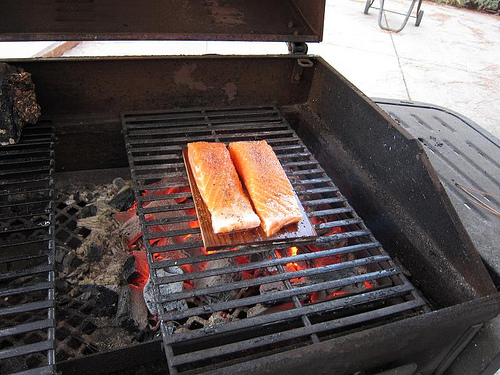
Many years ago, there was only one way of grilling food outdoors – charcoal grilling. There was no problem with that. The alluring taste of meats and greens grilled outdoors back then made sure people grilled their meals outdoors from time to time. Spring and summer were long awaited. Then came modernization and the need to simplify everything.
Years later, there was an electric version of nearly everything one could think of, including BBQ grills. But people soon realized one thing. No BBQ grill invention could match the taste of meals prepared on charcoal grills. So everyone went back to charcoal grills. That is still the case today. But think about it for a moment. With the amount of smoke that often comes off charcoal grills, is one’s health at stake?
Hydrocarbons
When charcoal is burned, two things are produced: hydrocarbons and soot. They both sound harmless which is of course, not the case. First off, hydrocarbons and soot pollute the air. But that is not everything. They can also worsen respiratory complications like asthma and lung cancer. It gets worse with the fact that the crispiness and dark quality of charcoaled BBQs that give meat woody flavors can form two types of carcinogenic compounds. The first compound, polycyclic aromatic hydrocarbon otherwise referred to as PAH is life threatening. The same can be said about the second compound, heterocyclic amines otherwise referred to as HCAs.
Fatty acids
A study conducted by health experts from Rice University in 2003 revealed that microscopic particles of polyunsaturated fatty acids get released into the air every time one grills meat on charcoal grills. The study went to explain that while the particles had little negative effects on human health, they contributed to air pollution around Houston Texas. This is strange and a coincidence of sorts, given that Texans are fond of saying they ‘live and breathe’ barbecues. Turns out they do just that. In fact, barbecue emissions come in third after vehicle and gas emissions as far as air pollution in Texas is concerned. That is according to a report released by the Texas Commission on Environmental Air Quality.
Carcinogens
Let's get back to PAHs and HCAs. The American Cancer Society notes that when one grills meat and fats drip down the charcoal, PAHs and HCAs rise with the smoke and get directly into your barbecue. This is certainly worrying. It gets worse with the fact that the longer one grills his or her BBQs the longer he or she ‘spices up’ the meal with these carcinogens. The National Cancer Institute backs these claims.
What should you do?
The facts discussed above should not discourage you from enjoying your BBQs. There are after all, several alternatives to charcoal. Your best bet is to observe healthy eating and cooking habits. You should also make an effort to ensure whatever is on your grill cooks well. Note that poorly cooked red meat is one of the main causes of cancer in the world. Cook well, then ensure all fats drip off from your grill. Avoid salting on the table. Do the salting and spicing on the grill. Ensure too that you get enough air as you grill your BBQs.
Charcoal alternatives
There are more than enough charcoal alternatives as already hinted. Briquettes top the list. They are not messy and easy to use. They are in fact, better in several ways than charcoal. First off, they burn for long. Then secondly, they produce enough heat to get anything grilled with ease. Gas grills also come in as viable charcoal grill alternatives. They are clean and can get your BBQs ready within minutes. It does not end there. Gas BBQ grills are also portable. The only downside with gas grills is the fact that they are slightly costly.